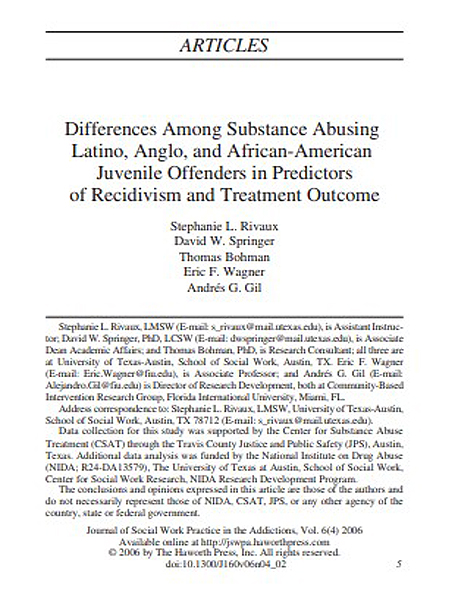Differences among substance abusing Latino, Anglo, and African-American juvenile offenders in predictors of recidivism and treatment outcome
 Abstract: Alcohol and drug use is prevalent among juvenile offenders and many of the risk factors that predict delinquent behavior also predict adolescent drug use. This study examined the impact of self-reported risk factors on treatment outcomes and recidivism among Latino, Anglo, and African American juvenile offenders. Risk factors included family structure and interactions, peer influences, education, psychiatric history, substance abuse history, stressful life events experienced, and use of leisure time. Analyses yielded the following key findings: Older adolescents and males were more likely to have a greater number and severity of offenses; older adolescents were less likely to complete treatment successfully; a curvilinear relationship existed between time in treatment and positive treatment outcomes, with extremely long treatment time associated with poorer outcomes; and significant differences existed between Latino and African American youth in which risk factors predicted outcomes. Implications for social work practice and research are discussed.
Abstract: Alcohol and drug use is prevalent among juvenile offenders and many of the risk factors that predict delinquent behavior also predict adolescent drug use. This study examined the impact of self-reported risk factors on treatment outcomes and recidivism among Latino, Anglo, and African American juvenile offenders. Risk factors included family structure and interactions, peer influences, education, psychiatric history, substance abuse history, stressful life events experienced, and use of leisure time. Analyses yielded the following key findings: Older adolescents and males were more likely to have a greater number and severity of offenses; older adolescents were less likely to complete treatment successfully; a curvilinear relationship existed between time in treatment and positive treatment outcomes, with extremely long treatment time associated with poorer outcomes; and significant differences existed between Latino and African American youth in which risk factors predicted outcomes. Implications for social work practice and research are discussed.
Rivaux, S.L., Springer, D.W., Bohman, T., Wagner, E.F., & Gil, A.G. (2006). Differences among Substance abusing Latino, Anglo, and African-American juvenile offenders in predictors of recidivism and treatment outcome. Journal of Social Work Practice in the Addictions, 6(4), 5-29. doi:10.1300/J160v06n04_02
